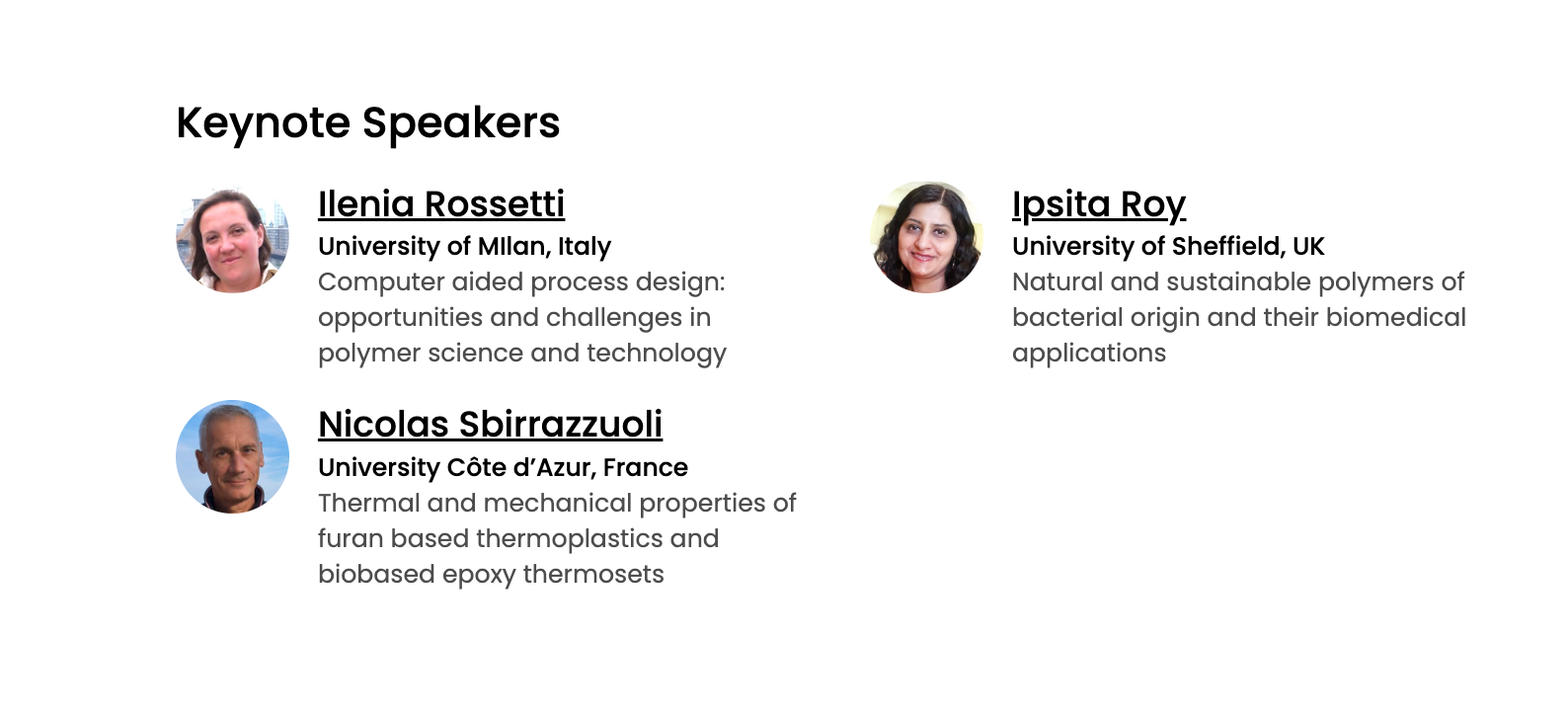Don’t miss the MIPOL2024 keynote lectures!
Every day of the MIPOL2024 congress program will begin with a keynote lecture, given by world-renowned experts in their respective fields, featuring cutting-edge research.

Hosting a keynote speaker at a congress represents a great opportunity to foster connections, business opportunities, learnings, inspiration, knowledge, and valuable experiences.
Keynote speakers are renowned experts in the topics they talk about. They have the competence and the skill to share relevant information, illustrate industry trends, provide insights and knowledge valuable to the event and the audience.
The qualities of a keynote are competence, credibility, the ability to inspire, promote networking and entertain. A keynote speaker can provide a favorable environment for attendees who intend to learn on hot topics in specific technological sectors and meanwhile to make connections that will add value to the overall experience of attending the conference. A good keynote speaker can engage with the audience and create a connection with them.
Let’s introduce the fantastic group of keynote speakers that you can meet at MIPOL2024! Go to Oral Presentations of the MIPOL2024 congress webpage and learn more about them.
Ilenia Rossetti, University of Milan, Italy Title of presentation: “Computer aided process design: opportunities and challenges in polymer science and technology”
Introducing Ilenia!
- Ilenia is professor of chemical plants at the University of Milan.
- She has been a guest scientist at the Universities of Cambridge, Paris, Cardiff.
- In 2016 she was awarded by the Industrial Chemistry Division the Chiusoli Medal, dedicated to Italian scientists aged 45 or less, who have achieved relevant scientific results in the field of catalysis.
What is Ilenia's research field? Ilenia works on very hot topics, such as the sustainability of the chemical industry for environmental protection. You will not be surprised, knowing her background, to learn that she has the skills and the knowledge to develop new processes exploiting raw materials and renewable energy sources, and to design how to revamp existing plants to adapt them to new raw materials. In detail, her research lines include the valorization of bioethanol as a renewable chemical platform for a biorefinery supply chain to produce hydrogen, bioethylene, acetonitrile, and ethylene oxide; the capture and reuse of CO2; the integration of key industrial chemical plants (ammonia, methanol, monomer production) with the use of renewable raw materials.
Ipsita Roy, University of Sheffield, UK Title of presentation: “Natural and sustainable polymers of bacterial origin and their biomedical applications”
Introducing Ipsita!
- Ipsita Roy earned her Ph.D. in Biochemistry from the University of Cambridge in 1992. She was awarded the prestigious Indian Inlaks Scholarship and the Overseas Research Students Award to support her Ph.D.
- Her post-doctoral work was at the University of Minnesota, USA, at the Bioprocess Technology Institute, where she worked on fatty acid biosynthesis.
- Afterward, she taught at the Indian Institute of Technology, India. During this time, she worked on the production of biodegradable polymers from Streptomyces.
- Ipsista Roy served at the University of Westminster from 2000 until August 2019.
What is Ipisita’s research field? Her main field of expertise is natural polymers of bacterial origin and their use in medical and environmentally friendly applications.
She is currently focused on the production of novel polyhydroxyalkanoates (PHAs). She has pioneered the production of PHAs from Gram positive bacteria which lack immunogenic properties and hence are excellent materials for medical applications. The application area is tissue engineering, soft tissue engineering, wound healing, drug delivery and medical device development. She has also initiated work with bacterial cellulose and γ-polyglutamic acid, as natural polymers for biomedical applications. She is started the study of the environmental aspects of PHAs, which are biodegradable both in the soil and in the sea. Finally, her most recent grant is from the 3D BIONET and involves the development of 3D cardiac tissue model and includes mathematical modelling in collaboration with the University of Oxford and Imperial College London.
Nicolas Sbirrazuoli, University of Cote Azur, France Title of presentation: “Thermal and mechanical properties of furan based thermoplastics and biobased epoxy thermosets”
Introducing Nicolas!
- Prof. Dr. Nicolas Sbirrazzuoli received his Ph.D. in 1992 from the University of Nice Sophia Antipolis for the study of polymeric materials and materials for energy storage (solar energy). During the years 1992-1933, he worked as a post-doc on Artificial Neural Network applied to chemistry.
- In 2000, he got a full Professor position at the University Côte d’Azur and developed methods and software for kinetic analysis of thermoanalytical data.
- He was Chairman of the Standing Committee on Human Resources for Chemistry at University Côte d’Azur, 2019-2021
- He is co-chair of the Kinetics Committee of the International Confederation for Thermal Analysis and Calorimetry, since 2021.
- Nicolas Sbirrazzuoli is ranked top scientist in Chemistry in the mondial ranking of Research.com and ranked in the Stanford University METRICS (top 5% of scientists on that list).
What is Nicolas’ research field? Nicolas Sbirrazzuoli is expert of the development of kinetic methods (polymerization mechanisms, vitrification, gelification, shift from chemical to diffusion control, relaxation and crystallization of polymers, crystallization - melting/re-crystallization, glass transition, physical ageing, thermal and thermo-oxidative degradation of polymers). He has developed methods and software for kinetic analysis of thermoanalytical data (including DSC, calorimetry, rheometry, TGA and DMTA). He developed new applications of stochastic temperature modulated DSC and Fast Scanning Calorimetry. He contributed to the development of “Advanced isoconversional kinetic analysis”. The method named SbC-Sbirrazzuoli crystallization, was recently implemented in commercial software. In 2004, he started working on biobased, biodegradable, renewable and non-toxic polymers and composites, resulting from the recovery of plant biomass, by-products of industry and biorefineries. He mainly worked on furanic thermosets, biobased epoxy and semi-crystalline polyesters. he pioneered with his team several studies on poly(ethylene 2,5-furandicarboxylate) (PEF), which is the biobased counterpart of petrobased PET and on humins, a co-product of sugar conversion from biorefineries.
Keynotes will be followed by state-of-the-art lectures given by distinguished scientists, most upon invitation, on selected topics. In this congress edition, we are receiving interesting abstracts dealing with bioactive polymers, polymeric nanocomposites, conducting polymers, biorefinery, sustainable polymers, polymeric flame retardants, polymer processing, mechanical and thermal characterization of polymers, synthesis of complex macromolecular architectures, eco-compatibility of polymers.
Don’t you think that these topics are extremely timely? To find out more, join us and attend the MIPOL2024 lectures.

